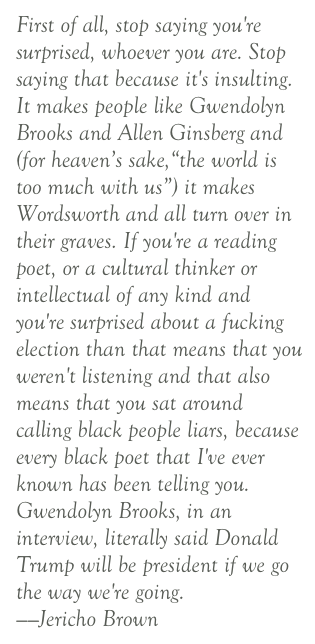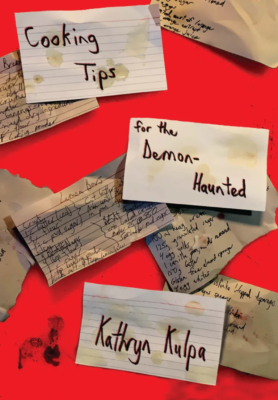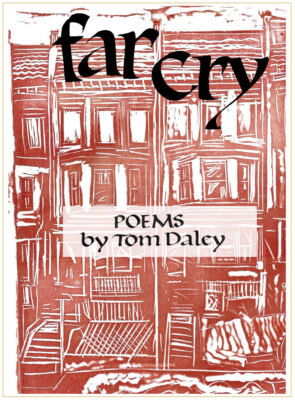 An Interview by Grant Clauser
An Interview by Grant Clauser
EVERYTHING HAS TO COME THROUGH YOU: A CONVERSATION WITH POET JERICHO BROWN, AUTHOR OF PLEASE AND THE NEW TESTAMENT
Jericho Brown, author of the prize-winning poetry collections Please and The New Testament, visited Bucks County Community College in September to give a reading. This interview was conducted at a picnic table outside the school’s auditorium building prior to the reading.
Brown, who teaches creative writing at Emory University, has received numerous awards for his poetry including the Whiting Writers Award and the American Book Award. He’s received fellowships from the Radcliffe Institute for Advanced Study and the National Endowment for the Arts. He was recently named poetry editor of The Believer. His poems are widely published in journals such as The American Poetry Review, The Nation and The New Yorker.
Grant Clauser: One thing I feel in your poems is a constant sense of motion—how they shift and pivot, like they’re running an obstacle course to get to something. I see that in the poems “Football Season” and others. Is that movement effect a conscious technique aim for or a expression of how you work through the poem on the page?
Jericho Brown: I think it’s a good idea to always be interested in creating what you wish was there, so what I try to do as a poet is make the poems I wish I were reading. It’s a matter of creating a need for something the reader may not have known he or she had a need for. And I think that’s how I want to live my life. When I’m teaching a class I try to do it how I would have wanted it done if I were the student. I want my poems to be like snapshots or a series of snapshots no matter how long the poems are. I want it to feel full, as is the case in a dream, but I also want it to have a certain kind of series of leaps that make sense, like in dream. So that’s part of what those pivots are about.
 Talking about them consciously isn’t something I would really be capable of doing because it’s something I think that you practice to the point that it becomes second nature. So for instance when you’re writing a really formal poem you know you’re good at it when you’re not counting numbers on your fingers. Iambic pentameter is not about how do I get to ten, it’s about knowing it second hand because you’ve been practicing. And because you know that, you’re able to make the sonnet without thinking “now I’m going to write a sonnet.” The poem is moving toward sonnet. I think that way about form, but I also think that way about certain things that I do in poems, like what you call pivot—I always think of hinge, something that allows me to leap into something else, it opens a door and suddenly you’re in another world. That you can have both of those worlds in a single poem has always fascinated me.
Talking about them consciously isn’t something I would really be capable of doing because it’s something I think that you practice to the point that it becomes second nature. So for instance when you’re writing a really formal poem you know you’re good at it when you’re not counting numbers on your fingers. Iambic pentameter is not about how do I get to ten, it’s about knowing it second hand because you’ve been practicing. And because you know that, you’re able to make the sonnet without thinking “now I’m going to write a sonnet.” The poem is moving toward sonnet. I think that way about form, but I also think that way about certain things that I do in poems, like what you call pivot—I always think of hinge, something that allows me to leap into something else, it opens a door and suddenly you’re in another world. That you can have both of those worlds in a single poem has always fascinated me.
I’ve always been really interested in trying to write life, and in writing a poem that is an organism, that is as complicated and complex as people are. I want my poems to be like me. I feel I’m a person in the world who upon being seen gets pinned down, and I hate that because it’s not true. I’m not one thing. I’m many things, and I’m that thing that people think I am. And I can be several things in a matter of five minutes. I can pray and love the Lord and get in my car and hit traffic and start cussing.
GC: How much do you think about the reader when you’re writing, and if you do, at what point does the reader enter into your process or in what way?
JB: I don’t think about the reader, but I do think about myself outside of myself. When I’m writing a poem I think about myself when I was nineteen or I think about myself given a feeling I had after seeing a piece of art or after having read a poem I love. How do I satisfy that reader in that moment? How do I satisfy the person I was the first time I heard Juvenile’s Back That Thang Up cause I was a happy and excited person who thought something new and wonderful was happening? It’s sort of a weird thing that when people ask about the reader, I think they mean someone other than me, but I can read, so I can just use myself. If I can get to the point that I like my poems, then that’s good.
I also think it’s important to have friends. Poets are clannish beings and I haven’t gotten to that point where I’m so solitary that don’t show poems to people. I want to see my friends’ poems and tell them that they’re bad, and for my friends to see my poems and tell me that they’re bad, or see my friends’ poems and say, “hey, I think this would be a better word here,” and I want them to do the same thing for me. In that way there’s a reader because there’s someone who can tell me when something is or is not working, but I don’t anticipate my friends when I’m writing. Mostly when I’m writing I just need to get everything down. As long as there are words on the page, as long as there’s text to work with, I’ll always be able to ask the poems questions that help me revise the poem. I just have to hold onto it long enough for it to answer those questions. Sometimes it can be a literal mess of words that don’t make any sense, but you can still say, “who is your speaker?” or “what is your occasion?” and sometimes that mess or words will begin to tell you, to translate itself.
GC: As a teacher of poetry-writing, what are the most important ideas you want to get across to your students, and what are the hardest ones for them to learn?
JB: I think with beginning poets there’s always a bit of wanting to write the feeling rather than the image or the experience or even just the music that would get us to that feeling. Ultimately what I teach is strategy. More than teach them to write, I think I teach them to read without reading for explication or interpretation. To read in a way that leads them to wonder why they’re turned on by something. The reason you’re turned on by something is not what it means, and we know this because everyone has a tree, and we’ll sit there and love that tree, but we don’t explicate a tree. We say, “oh, there’s a tree, it’s beautiful.” And then we might say the reason the tree is beautiful is because as I’m looking at it from this vantage point it is an interesting color against the blue sky that makes the green look different. And it’s not so much that the tree is beautiful, it’s that the blue sky is beautiful.
GC: One of the things that’s both necessary in poems yet impossible to teach is passion or intensity. Your poems have that. So my question is how does one cultivate that, how do you make sure it’s there and available to the reader?
JB: Passion comes from subject matter, which is something we shouldn’t think about when we’re writing. The important thing about writing is that you ask yourself poetics questions. How do I end in an abstraction? How does one make use of a contraction? Is it possible for me to have a direct address? Asking those kinds of questions leads to poems. What those poems are about should be second hand, should be what comes out of your language in trying to answer those poetics questions. And you’ll find out what you’re interested in through trying to answer those questions. As a poet who’s sitting around trying to write about injustice or love, if you start that way, saying I’m going to write about hatred or I’m going to write about God, then you are also going to write a bad poem. Whereas if you try to answer questions with poetics you will find yourself writing about God in order to answer these poetics questions and you will realize, oh, I really care about God.
The thing I notice in my students’ work is that at first in the intro class in their first poems they all have either birds and or trees, and they really don’t give a shit about birds, because they’re always just birds. They really haven’t ever noticed a bird in their lives, but they have this idea that they’re writing a poem so they need a bird. Instead of believing in the things that obsess them, and letting those things come out in the poem as opposed to writing about them in the poem. Then you’ll have that intensity and passion you’re talking about, because it hasn’t been prepped. You’re not trying to organize it. It is making it’s own way into the writing.
GC: In another interview you mention shame, as in poets feeling ashamed to be poets, to let people know that’s what they are? Whereas football players aren’t ashamed of being football players. Can you explain that? What motivates it?
JB: Poets are really subversive people and they’ve got a problem with everything, and that’s what I like about them. I like that when you show a poet something they immediately say, “well, that’s not what that is, I’m skeptical.” I’m the guy, who when I watch Game of Thrones, the entire time I’m wondering at which point they have body doubles. That’s why I watch it, so I can catch the body doubles. I think that poets are naturally that way, and I think that’s a good thing, but I think sometimes we’re that way about one another and ourselves in a way that is not useful to us in the long run.
We do have some things we love. We love poetry, and we’re not helpful to it when we are ashamed of it. Nobody wants to tell anybody they’re a poet. I say let’s make people afraid of you. Let’s let people go through whatever they go through when you tell them you’re a poet. Given the cultural impact that we make over time, we have to begin to be proud of the work that we do. The poet is always there. Even when we’re dead we’re always there. And we have to begin to herald and shout that out. The thing that we actually do is complain that nobody’s reading poetry. But who would? They’re ashamed of themselves. You know what I mean? You can’t have both.
GC: Related to that—we have a section on Cleaver called Life in Activism to encourage artists to express themselves politically. What do you think of the role of the poet as a voice in the world, as an activist?
JB: Right now, considering that we’re in the middle of a political crisis, I wish people would just understand. First of all, stop saying you’re surprised, whoever you are. Stop saying that because it’s insulting. It makes people like Gwendolyn Brooks and Allen Ginsberg and (for heaven’s sake, “the world is too much with us”) it makes Wordsworth and all turn over in their graves. If you’re a reading poet, or a cultural thinker or intellectual of any kind and you’re surprised about a fucking election than that means that you weren’t listening and that also means that you sat around calling black people liars, because every black poet that I’ve ever known has been telling you. Gwendolyn Brooks, in an interview, literally said Donald Trump will be president if we go the way we’re going, so when you say you’re surprised, you’re really insulting a bunch of people. So everybody who’s saying that needs to stop saying that—or be embarrassed about feeling that way.
 Instead, it would be a good idea to assume that we are now living in the apocalypse, and so if you don’t want to live in the apocalypse you need to act as crazy as a person would act in order to get out of the apocalypse…because what you were doing before clearly did not work. So this idea of whether the poet is a political being, when everything about the history of poets tell us that it’s all the poet ever was, is just some American bullshit. And I don’t know why Americans need bullshit, but they clearly need it the way they need mayonnaise, and it’s shit. It’s going to get in your arteries and kill you. It’s going to get crazy people elected. So that’s sort of number one.
Instead, it would be a good idea to assume that we are now living in the apocalypse, and so if you don’t want to live in the apocalypse you need to act as crazy as a person would act in order to get out of the apocalypse…because what you were doing before clearly did not work. So this idea of whether the poet is a political being, when everything about the history of poets tell us that it’s all the poet ever was, is just some American bullshit. And I don’t know why Americans need bullshit, but they clearly need it the way they need mayonnaise, and it’s shit. It’s going to get in your arteries and kill you. It’s going to get crazy people elected. So that’s sort of number one.
At the same time I do not think that the poet can think about any of those things while he or she is writing poems. When I’m writing poems I need to allow my obsessions to come through without pushing them. The question though, is, have I really opened my mind, to everything that could possibly obsess me. So my issue is never reading a poem and feeling that the poem isn’t political enough. But reading a poet over a period of sixty years and all they can write about for that sixty years is that same damn dog that they’ve been writing about since their first book. That seems strange to me. It seems odd to me that every one of us at this point has literally seen an unarmed black man murdered by a police officer for no reason. Whether we saw it on Twitter, Facebook, television, we’ve literally seen it happen. So it seems to me that if you’ve seen a human being shot by another human being for no reason, that you have an experience, because you’re a human being. You have an empathetic and sympathetic experience. You’re world is rocked. You see this thing, you lose you’re mind. I’m not saying anyone has to write anything, but I think it’s reasonable to question why they only see one side of life. I think it’s important for poets to begin to question whether or not they are living fully.
Whether or not they are experiencing all of life about them. It may not be that it is your responsibility as a poet to write as an activist or to write politically, but it is your responsibility as a poet to live fully. You are a repository. Everything has to come through you. And so I need to see what happens when we have so-called political moments come through the poets. And I think we need that. I think it’s important. So I’m not saying we need all poets to start writing about feminism or race or the fact that we’re absolutely dastardly to Muslim people in this country. That would be a waste of time. But I do think it’s important for poets to observe what they’re observing. Pay attention to what’s around you, and stop pretending it’s not there, instead of writing about that same damn flower.
How is it possible that other things have not found their way into your poems? And I know the answer. It’s possible because you refuse to see anything other than your garden, and you’ve built a life that allows you to not see anything but your garden. You have to build that life at this point. We’re more connected now than ever before. People are willfully not knowing. If you’re a poet, that seems to me odd, considering what we know about negative capability, what we know about tradition and individual talent.
GC: What are you working on now? Will the next book have anything in common with the last one, or will it take a different path?
JB: Today, I am at work on A Little Evil, a third collection of poetry written in the voices of personae and in the mode of meditations on literature, visual art, and film. I am asking myself new questions about how to allow poetry and other forms of art I love to influence my writing. In these poems, speakers address characters like Rufus from James Baldwin’s novel Another Country and High John from Daniel Minter’s painting High John the Conqueror. According to the poet Wanda Coleman, “Art feeds art,” and this manuscript is my way of proving that dictum. Some of the poems question our national obsession with horror films and investigate our love for celebrities with lines like “…I’m alone in the dark. I’ve paid for myself/To see Sandra Bullock try and hate/A handsome man…” Critics have said that this theatrical darkness is a kind of consciousness in which we allow an actor to perform an aspect of ourselves, so that watching the film is both private and public at once.
Because I am now more fully aware of my obsessions my subject matter, I want A Little Evil to question whether there is such a thing as “universal” and whether experiences that are not universal can be rendered as the so-called sublime. I am using personae to more fully understand whether or not the body is at different levels of risk when it is raced, gendered, or disabled.
Many of the poems in A Little Evil see the body as a repository for history. Its speakers turn toward other genres and forms because they want to believe that art can facilitate healing. In a few of the poems, the body attempts to split itself from its history, creating speakers who sound maniacal or surreal. A gravedigger sings love songs while burying the tortured and murdered in the poem “Shovel.” A football player guesses at the outcome of his very short career with, “That’s the dream, how we die” at the end of “Success Story.” Can the body wracked by history be reclaimed without suffering insanity? These poems are not so sure. If I had to sum the book’s poetics with a few of its lines, I might choose these from “Before Dawn”: “How long must I/Claim beauty where there is/Only truth.”
A Little Evil is a book about the malnourished and persecuted body. I explore how even that body learns to thrive despite the stories grafted upon it, experiences that mean to degrade and devalue it. What I have written leads me to a hypothesis: in several of these poems, speakers learn—through touch of their own and other bodies—to love themselves rather than wish for death.
Grant Clauser is the author of four poetry books, most recently The Magician’s Handbook (PS Books, 2017) and Reckless Constellations (Cider Press Review, 2018). His poems have appeared in The American Poetry Review, The Journal, The Literary Review, Painted Bride Quarterly, Tar River Poetry and others. Follow him at @uniambic.
is the author of four poetry books, most recently The Magician’s Handbook (PS Books, 2017) and Reckless Constellations (Cider Press Review, 2018). His poems have appeared in The American Poetry Review, The Journal, The Literary Review, Painted Bride Quarterly, Tar River Poetry and others. Follow him at @uniambic.
Read more from Cleaver Magazine’s Interviews.



